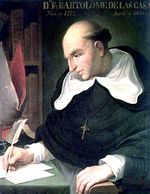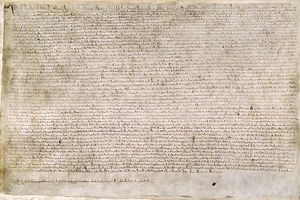« 基本权利的起源 » : différence entre les versions
Aucun résumé des modifications |
(→政治起源) |
||
| Ligne 76 : | Ligne 76 : | ||
= 政治起源 = | = 政治起源 = | ||
基本权利的政治起源可以通过一系列影响全球政治思想和实践的重要历史事件来追溯,每一个事件都为人权大厦贡献了一块基石。 | |||
1215 年在英格兰签署的《大宪章》是对皇权进行法律限制的首批具体实例之一。尽管其主要目的是保护贵族的权利不受国王专权的侵犯,但它引入了公平审判权等基本原则,影响了未来的法律权利和宪政治理观念。16 世纪,由马丁-路德(Martin Luther)和约翰-加尔文(John Calvin)等人发起的新教改革挑战了天主教会的中央集权,提倡良心自由和个人解释圣经的思想。这些思想有助于形成个人权利和个人主权的现代观念。欧洲宗教战争的结束和 1648 年《威斯特伐利亚条约》的签署不仅重绘了欧洲的政治版图,还引入了国家主权和互不干涉原则等关键概念,对个人和集体权利产生了影响。1776 年美国革命产生了巨大影响,美国《独立宣言》宣布了基本平等和不可剥夺权利等原则。这些思想在法国大革命期间得到了继承和发展,特别是 1789 年的《人权和公民权 利宣言》,其中明确规定了自由、财产、安全和反抗压迫等权利。最后,1815 年维也纳会议虽然常被视为保守复辟时期,但却奠定了现代外交和国际法的基 础,在全球范围内承认和保护基本权利方面发挥了关键作用。这些跨越几个世纪的事件为基本权利概念的演变做出了重大贡献。它们不仅塑造了法律和政治制度,还塑造了支撑现代社会的价值观和理想,使人权得到普遍承认,并使人权保护成为司法和国际治理的重要组成部分。[[Fichier:Magnacarta.jpg|thumb|大宪章]] | |||
[[File:Joao sem terra assina carta Magna.jpg|thumb|150px| | [[File:Joao sem terra assina carta Magna.jpg|thumb|150px|英国国王约翰签署《大宪章》。]] | ||
在 13 世纪的英格兰,发生了一件具有里程碑意义的事件,深刻影响了法律和政治历史的进程:1215 年 6 月 12 日起草并签署了《大宪章》,或称 "大宪章"。这份历史性文件是英格兰国王约翰与他的一群臣子(主要是心怀不满和叛乱的男爵)之间激烈冲突的结果。大宪章》是限制君主专权和奠定宪法基础的决定性转折点。 | |||
当时的背景是贵族们的不满情绪日益高涨,这主要是由于约翰国王征收的高额税收以及他在军事行动中的失败,尤其是在法国。面对男爵们越来越多的反抗,国王被迫进行谈判,最终制定了《大宪章》。这份文件之所以具有革命性,有几个原因。首先,它承认并保障了男爵的一系列权利和特权,进而也保障了王国其他臣民的权利和特权。虽然《大宪章》的主要目的是保护贵族的利益,但它所包含的原则也唤起了我们对个人自由的现代概念。这些原则包括保障公平审判、防止任意拘留以及限制国王的财政权。此外,《大宪章》还确立了国王也受法律约束的理念。这在当时是一个革命性的观念,因为当时的君主往往被认为拥有绝对的神授权力。法律同样适用于君主的观念为西方社会的法治和宪政奠定了基础。尽管《大宪章》在首次颁布后的岁月里屡次被废除、修订和恢复,但其影响却经久不衰。它通常被视为现代宪法的先驱,不仅在英国,而且在全世界都对法律制度和人权的发展产生了重大影响。 | |||
大宪章》中的这些条款说明了该文件在权利和自由方面的革命性范围和愿景。特别是第三十九条,它确立了对现代法律制度至关重要的司法原则。自由人不应在未经同侪合法判决的情况下根据国家法律受到惩罚,这一观点在当时具有革命性意义。该条款为我们今天所熟知的公平审判权奠定了基础,是法治的关键要素和人权的基本原则。{{citation bloc|任何自由人都不会被逮捕或监禁,或被剥夺财产,或被宣布为亡命之徒,或被流放,或被以任何方式处死;未经同侪的合法判决,也未依照国家法律,我们不会对他采取行动,也不会派人对付他。|Article XXXIX.}}第 XLI 条侧重于经济自由和商人安全。它承认商人安全和不受阻碍地进行贸易和旅行的重要性,同时规定了战时的行为规则。该条款反映了对贸易和经济流动性重要性的早期理解,这些概念在我们的全球化经济中至关重要。{{citation bloc|所有商人均可自由、安全地离开英格兰、来到英格兰、留在英格兰,并在英格兰境内通过公路和轮船进行买卖,按照古老而公正的习俗,不收取任何不合规定的过路费,但战时和来自与我国交战国的商人除外。如果在战争开始时在我国发现这些商人,他们应被扣留,其人身或财产不受任何损害,直到我们或我们的大法官得知我国商人在与我们交战的国家受到的待遇,如果我们的商人是安全的,其他人在我国也应是安全的。|Article XLI.}} | |||
这些条款共同见证了正义、个人自由和经济权利观念的逐步演变。尽管《大宪章》的主要目的是保护英国贵族的权利,但它为数百年后惠及所有公民的法律原则奠定了基础。该文件确立了限制专制权力和保护个人权利的标准,影响了西方世界宪政民主和法律制度的后续发展。这些原则在八个多世纪前就已阐明,如今仍在世界各地的权利宪章和宪法中回响,证明了其永恒的重要性以及对人权概念和公平治理的持久影响。 | |||
英国国王与议会之间的冲突在某些历史时期尤为突出,在许多保障基本权利的文本和条约的制定过程中发挥了至关重要的作用。这些冲突往往是宪法和法律重大变革的推动力,有助于形成民主治理和人权原则。 | |||
最显著的例子之一是 17 世纪的英国内战时期,国王查理一世的保皇党势力与议会党人对峙。这场冲突最终导致查理一世于 1649 年被处死,并在奥利弗-克伦威尔的领导下建立了英格兰自由邦,标志着一个实验性的共和主义时期。虽然英联邦是短暂的,随着 1660 年君主制的恢复而结束,但这一时期对政治和宪法思想的发展具有重要意义。另一个关键时刻是 1688 年的光荣革命,英国国王詹姆斯二世被废黜,由玛丽二世和她的丈夫威廉-奥伦治取而代之。这一相对和平的过渡导致 1689 年通过了《权利法案》,这份基本文件明确限制了王权并肯定了议会的权利。特别是,它确立了未经议会同意国王不得统治的原则,并保障了议会中的言论自由、税收限制和公平审判权等权利。 | |||
这些事件以及君主权力与议会之间的其他类似冲突,有助于形成一种以尊重基本权利和限制政府权力为核心的政治传统。它们为后来英国议会民主制的发展奠定了基础,并影响了世界其他地区的政治思想,尤其是在美国建国者起草《美国宪法》和《独立宣言》时对他们产生了启发。英国国王与议会之间的这些冲突对于民主治理和尊重基本权利原则的出现和巩固至关重要,这些原则继续影响着世界各地的政治和法律制度。 | |||
= | = 哲学渊源 = | ||
John Locke, a seventeenth-century English philosopher, had a profound influence on modern political theory, particularly with regard to the concepts of natural rights and civil government. His thought, articulated mainly in two major works, "Two Treatises on Government" (1690) and "An Essay on Human Understanding" (1689), laid the foundations of liberal philosophy and had a considerable impact on the development of democratic and constitutional ideas. Locke proposed a vision of government based on the idea that legitimate political authority derives from the consent of the governed. This notion of voluntary consent is a cornerstone of his political theory and marks a break with earlier conceptions of divinely ordained monarchical power or the unchallenged supremacy of the state. For Locke, individuals are naturally free and equal, and any legitimate government must be based on the agreement and acceptance of those it governs. | John Locke, a seventeenth-century English philosopher, had a profound influence on modern political theory, particularly with regard to the concepts of natural rights and civil government. His thought, articulated mainly in two major works, "Two Treatises on Government" (1690) and "An Essay on Human Understanding" (1689), laid the foundations of liberal philosophy and had a considerable impact on the development of democratic and constitutional ideas. Locke proposed a vision of government based on the idea that legitimate political authority derives from the consent of the governed. This notion of voluntary consent is a cornerstone of his political theory and marks a break with earlier conceptions of divinely ordained monarchical power or the unchallenged supremacy of the state. For Locke, individuals are naturally free and equal, and any legitimate government must be based on the agreement and acceptance of those it governs. | ||
Version du 18 décembre 2023 à 20:59
法律入门:关键概念和定义 ● 国家:职能、结构和政治制度 ● 法律的不同部门 ● 法律渊源 ● 法律的主要形成传统 ● 法律关系的要素 ● 法律的适用 ● 法律的实施 ● 瑞士从起源到20世纪的发展 ● 瑞士的国内法律框架 ● 瑞士的国家结构、政治制度和中立 ● 19世纪末至20世纪中叶国际关系的演变 ● 世界组织 ● 欧洲组织及其与瑞士的关系 ● 基本权利的类别和世代 ● 基本权利的起源 ● 十八世纪末的权利宣言 ● 二十世纪基本权利普遍概念的构建
基本权利通常被称为人权,是旨在保护个人尊严和自由的基本法律原则。这些权利植根于不同的历史和哲学传统,现已在全世界得到普遍承认和尊重。
基本权利的最早踪迹可追溯到古代文明和宗教典籍,在这些典籍中,正义和公平的概念早已存在。例如,《旧约》的法律、罗马法和古希腊的哲学教义都对个人的权利和义务进行了原始的思考。在中世纪,这些概念继续发展,尤其是在欧洲。1215 年在英格兰签署的《大宪章》是赋予某些权利的法律文件的早期范例,如获得公平审判的权利和免受皇室专横的保护,尽管这些权利仅限于社会的一部分。启蒙运动是基本权利发展的关键时期。约翰-洛克(John Locke)等哲学家在 1689 年的著作《政府论》(Two Treatises on Government)中倡导自然和不可剥夺权利的概念,让-雅克-卢梭(Jean-Jacques Rousseau)则提出了社会契约的思想,为人权奠定了理论基础。他们的思想启发了若干历史性宣言,包括 1776 年美国的《独立宣言》和 1789 年法国的《人权和公民权利宣言》。这些文件是革命性的,正式承认了自由和平等等权利。二十世纪,国际社会在承认基本权利方面取得了重大进展。第二次世界大战的恐怖使全球意识到保护这些权利的必要性。1945 年成立的联合国在这一发展中发挥了关键作用。1948 年通过的《世界人权宣言》是一个里程碑,确立了一套全世界公认的基本权利。
多年来,许多国家已将这些原则纳入本国宪法和法律。1950 年通过的《欧洲人权公约》等国际条约加强了对这些权利的保护和促进。
宗教起源
在古代,我们今天所理解的个人权利概念其实并不存在,个人往往受制于国家或社会强加的严格规则和标准。
例如,在斯巴达,生活受到国家的严格控制。独身是被禁止的,因为斯巴达社会强调军事力量和繁衍,以维持一支强大的军队。人们期望斯巴达公民主要通过生育和服兵役为社会做出贡献,因此限制了他们的个人自主权。在古罗马,法律规定了日常生活中的一些方面,而这些方面在今天被视为隐私。例如,限制饮用纯酒。这些规定反映了当时对道德和社会的关注,当时人们重视节制和自我控制。在雅典,对妇女的限制也说明当时还没有我们所知的个人权利。雅典妇女在很大程度上被限制在家庭范围内,几乎没有政治或法律权利。对妇女出城所穿裙子数量的限制,就是该社会对妇女自主和自由诸多限制的一个例子。
这些例子表明,在古代,个人的自主权往往服从于社会或国家的需要。我们在现代人权背景下所理解的精神和身体完整权并未得到承认。个人在很大程度上被视为集体的成员,对集体负有义务和责任,而不是拥有不可剥夺权利的实体。几个世纪以来,这种对个人和权力的看法发生了很大变化,最终导致我们今天所熟知的基本权利得到承认。
在古代社会,尤其是在雅典,自由通常被视为参与公共生活和国家管理的能力。这种参与被视为公民的特权和责任,但仅限于一部分人口--通常是拥有土地的自由男性。妇女、奴隶和外国人被排除在政治参与之外。在这种情况下,不存在现代意义上的公认的个人自由领域。权利和自由是由社会地位和政治社会成员来界定和限制的。隐私和个人权利并没有得到广泛认可或重视。
另一方面,基督教的出现为个人和自由的概念带来了新的内涵。基督教提出了在上帝面前人人平等的观念,这在当时是一种革命性的观念。这一观点为进一步承认每个人的尊严和内在价值奠定了基础,无论其社会地位或在政治社会中的角色如何。随着时间的推移,基督教关于爱邻里、同情心和在上帝面前人人平等的教义帮助削弱了古代僵化的社会和法律结构。这些思想为现代人对自由的理解奠定了基础,在这种理解中,个人的价值不仅取决于其参与公共生活的能力,还植根于其作为人的尊严和权利。然而,必须指出的是,自由和个人权利观念的转变并不是随着基督教的出现而一夜之间发生的。这是一个渐进的过程,几个世纪以来受到许多其他历史、哲学和文化因素的影响。
基督教教义深深植根于《圣经》文本和传统,提出了关于人性和尊严的革命性观点,对西方思想产生了深远影响。这一观点的核心是相信每个人都是按照上帝的形象创造的,这一思想源于希伯来经文,并被早期基督教思想家所采纳和发展。这一理念通过确认所有人都是按照上帝的形象创造的,引入了基本平等和每个人与生俱来的尊严的概念。这种观念与古代社会盛行的社会等级制度和权力结构截然不同。例如,在罗马社会,公民、非公民、奴隶和自由民之间有着严格的区别,而基督教教义则提供了一个不同的视角,肯定了所有人的平等价值,无论其社会地位如何。此外,灵魂不灭的信仰是基督教的核心理念,它强化了人类固有和永恒尊严的观念。这种观点鼓励人们将人的生命视为具有超越物质和世俗的意义。希波的奥古斯丁(公元 354-430 年)和托马斯-阿奎那(公元 1225-1274 年)等基督教思想家探讨了这些观点,强调了精神生活的重要性和人类灵魂的永恒价值。
这些教义对西方的自由和人权观念产生了深远而持久的影响。古代社会主要关注集体和个人在国家中的地位,而基督教则引入了一个新的维度,即个人价值。这一变化对于后来人权和尊重个人观念的发展至关重要。这些观念对西方政治和社会思想的形成起到了至关重要的作用,影响了 16 世纪强调个人良知重要性的新教改革运动,以及约翰-洛克等哲学家提出自然权利和政府理论的启蒙运动。因此,基督教奠定的基础为人们更丰富、更细致地理解个人自由和人权铺平了道路。
耶稣基督所教导的基督教的核心理念是,尘世生活只是人类存在的一个短暂阶段,人的存在是为了永生。这一观点深刻地影响了西方文化和思想对人类尊严的认识和评价。根据这一观点,尘世生活被视为一种准备,是通往永生这一最终目的地的道路。这一概念超越了仅以物质或时间为中心的生存理念。它将重点放在生存的精神和道德方面,强调同情、热爱邻里和追求美好生活等价值观。这种对人类永生使命的理解使人们更加重视每个人的尊严。在这一世界观中,个人的价值不在于其尘世的成就、社会地位或财富,而在于其作为按照上帝的形象创造并注定永恒命运的人的本质。这种尊严与生俱来,不可剥夺,与外部环境无关。
这一愿景对权利和自由概念的影响是巨大的。它是所有人都值得尊重和考虑的思想基础,因为每个人都具有不可估量的价值。几百年来,这一观点影响了各种社会和政治运动,特别是那些寻求促进正义、平等和保护最弱势群体的运动。从历史上看,它也为基督教伦理的发展提供了依据,并影响了圣奥古斯丁和圣托马斯-阿奎那等思想家,他们试图将这些思想纳入更广泛的神学和哲学框架。后来,在现代,这一理念影响了启蒙运动的哲学家和自由民主的奠基人,他们阐明了自然权利和个人主权的原则。
基督信息的第二个基本主张,即人人都是上帝的儿女,对西方思想中对人类平等和兄弟情谊的理解产生了深远而持久的影响。这一思想强调所有人在上帝面前一律平等,提出了与许多古代和中世纪社会普遍存在的社会等级和地位差别截然不同的平等原则。基督教教义认为,每个人都是上帝的孩子,这意味着所有人都有共同的尊严和内在价值。这一观点是革命性的,尤其是在阶级、种族、性别和民族差别往往根深蒂固的历史背景下。基督教宣称在上帝面前人人平等,从而挑战了这些分歧,促进了人类的统一和团结意识。
上帝对其所有子女的爱是平等的,这一思想也影响了人权的概念。如果所有人作为上帝的儿女都是平等的,那么他们都应该得到公平的待遇和对基本权利的尊重。这种思想是历史上社会改革和正义运动的重要推动力。圣方济各(Saint Francis of Assisi)等历史人物宣扬对众生的爱和博爱,马丁-路德(Martin Luther)等改革者强调信仰和恩典对所有人的重要性,他们都体现并传播了这些思想。后来,在启蒙运动的背景下,约翰-洛克和让-雅克-卢梭等哲学家虽然并不总是直接引用这些基督教教义,但他们提出的政治和社会思想与人人基本平等的原则产生了共鸣。
每个人都享有实现自身命运的个人自主权,这是精神和个人使命至上的世界观的一部分。这种观点受到基督教的影响,强调社会、政治和经济结构是服务于人类精神追求的手段,而非目的本身。这种观点与早期的观点形成了鲜明对比,在早期的观点中,个人往往被视为从属于国家或社会的需要。根据这种观点,国家和其他社会机构有责任尊重和保护个人的自主权。这意味着承认良心、思想和表达自由的权利,以及重视隐私和个人自由。国家应为个人服务,而不是相反,这一理念是政治和社会思想的重要发展,对现代人权和民主治理理论产生了深远影响。这一理念在文艺复兴和启蒙运动时期引起了特别的共鸣,当时哲学家们开始质疑传统的权力结构,并提倡每个人与生俱来的自然权利。约翰-洛克(John Locke)等思想家捍卫生命权、自由权和财产权,伊曼纽尔-康德(Immanuel Kant)的绝对命令强调尊重每个人本身就是目的,这些思想家帮助塑造了这一观点。
在实践中,这种哲学影响了基本文件的起草,如《美国独立宣言》和法国大革命期间的《人权和公民权利宣言》。这些文件提出的理念是,建立政府是为了保护个人权利,政府的合法性来自于被统治者的同意。因此,每个人都有实现自己命运的个人自主权,这一思想是西方社会朝着个人自由、尊重个人权利和民主治理原则演变的根本。这些理念继续构成当代自由和民主社会的基础,强调个人在社会和政治秩序中的重要性。
基督教思想对西方人权发展的影响与十六世纪西班牙天主教法律神学家的工作有着深刻的联系,特别是在围绕西班牙征服美洲的辩论中。这些辩论集中在西班牙征服者对待美洲原住民的关键道德和法律问题上。
巴托洛梅-德拉斯-卡萨斯(Bartolomé de las Casas)是这场辩论中的关键人物之一,他是一位多明我会牧师,后来成为主教,因热情捍卫土著人民的权利而闻名于世。拉斯-卡萨斯对美洲印第安人遭受的暴行和剥削感到震惊,他反对为奴役他们辩护的理论和做法。他主张承认美洲印第安人的人性和基本权利,认为美洲印第安人是上帝的子民,应该得到与欧洲人同样的尊重和尊严。这些辩论中的另一位重要人物是弗朗西斯科-德-维多利亚,他是一位神学家和法学家,被认为是现代国际法的创始人之一。维多利亚根据自然法原则质疑西班牙征服的合法性。他认为,土著人民拥有自己的主权权利,他们的领土不能被正当地占有。他的观点为主张土著人民的基本平等和权利奠定了基础。
这些辩论是在欧洲与美洲相遇所引发的伦理和法律问题的大背景下进行的。西班牙神学家和法学家在西方最早的人权理论的发展过程中发挥了至关重要的作用,他们根据基督教原则阐述了承认土著人民尊严和权利的论点。这一时期在人权史上具有根本意义,因为它标志着伦理和法律原则开始在全球范围内得到应用,超越了国界和文化。de las Casas 和 de Vitoria 等人提出的思想和论点为后来的国际人权法奠定了基础,强调了人的尊严和平等的普遍重要性。
弗朗西斯科-德维多利亚和巴托洛梅-德拉斯-卡萨斯在西方首次对人权进行了理论阐述,这标志着承认人权的一个重要转折点。这两位人物在挑战 16 世纪西班牙征服美洲的伦理和法律基础方面,尤其是在对待土著人民方面,发挥了决定性的作用。
弗朗西斯科-德维多利亚是西班牙神学家和法学家,常被视为现代国际法之父。他出生于 1492 年,提出了捍卫美洲土著人民权利的理论,质疑西班牙征服者统治美洲土著人民的合法性。他认为,印第安人在私人和公共领域都有自己的主权权利,这些权利应得到尊重。维多利亚认为,土著人民有权自己管理和拥有自己的土地,这些观点在当时具有革命性意义。巴托洛梅-德拉斯-卡萨斯(Bartolomé de las Casas)是一位多明我会牧师,生于 1474 年,因热心捍卫土著人民而闻名于世。他谴责西班牙征服者的暴行,主张尊重印第安人的尊严和权利。德拉斯-卡萨斯认为,印第安人本身也是人,具有理性和信仰能力,因此应该受到公平公正的对待。通过承认土著人民的平等权利,维多利亚和拉斯-卡萨斯为超越文化和国界的人权概念奠定了基础。他们的学说意味着,所有人,无论其种族或地理起源,都拥有不可剥夺的权利,这些权利必须得到尊重。
因此,这一时期标志着西方开始将人权概念化,并特别强调民族平等和主权。虽然维多利亚和拉斯卡萨斯的思想没有立即导致重大的政治或社会变革,但他们奠定了思想和道德基础,影响了后来人权理论和国际法的发展。因此,16 世纪在西班牙可被视为人权思想演变的关键时刻。
« 我们的宗教是统一的,可以适应世界上所有的民族;它欢迎所有的民族加入它的怀抱,不会剥夺任何一个民族的自由或他们的主人;它尤其不希望人们像主教大人所说的那样,借口他们生来就是为了宗教而成为奴隶。因此,愿陛下在即位之初,对这一邪恶学说表示蔑视,并摒弃其后果。 »
— Las Casas
巴托洛梅-德拉斯-卡萨斯(Bartolomé de las Casas)的这段话完美地诠释了他面对西班牙征服,捍卫美洲原住民权利和尊严的承诺。在恳求中,拉斯-卡萨斯强调了几个要点,这些要点不仅反映了他的宗教信仰,也体现了他深厚的人文主义情怀。首先,他肯定了基督教的普世性,强调它注定属于所有民族,欢迎所有民族一视同仁。这种对基督教的普遍性和包容性的看法是至关重要的,因为它摒弃了某些民族可能在本质上低人一等或注定被统治的观点。其次,拉斯-卡萨斯强调尊重各民族的自由和自治。他公开批评皈依基督教或接受西班牙统治会导致土著人民丧失自由或主权的观点。他认为,基督教不是统治的工具,而是精神提升和相互尊重的手段。最后,他直接呼吁皇室当局(此处指西班牙君主)采取立场,反对以宗教或种族为由为奴役和压迫土著人民辩护的理论。拉斯-卡萨斯的这一行动呼吁领导人承担道德和政治责任,敦促他们摒弃那些使不公正和不平等永久化的意识形态。拉斯-卡萨斯的名言是美洲殖民化早期的有力见证,当时像他这样捍卫土著人民权利的声音不绝于耳。他的论点和行动对人权思想的起源以及对征服和殖民化的第一次正式批判的发展起到了至关重要的作用。
他证明印第安人是上帝的创造物,不能成为奴隶。他赞同维托利亚的论点:
« 在生活在这些偏远王国的异教徒中,他们从未听说过基督,也没有接受过信仰,但他们中也有真正的领主、国王和王子。自然法和万民法赋予他们主权、尊严和王权...... 这同样适用于私人对劣等财产的统治...... »
— Las Casas[4]
巴托洛梅-德拉斯-卡萨斯的这段话说明了他反对奴役和压迫土著人民的论点,肯定了土著人民作为上帝的创造物所固有的平等和主权。他明确承认土著人民现有领导人和政治结构的合法性和权威性,即使是那些没有接触过基督教的人。拉斯-卡萨斯在论证中驳斥了这样一种观点,即原住民可能因为缺乏基督教知识而被合法征服或剥夺土地和主权。他指出,自然法和万民法(ius gentium,中世纪和文艺复兴时期思想中的一个重要国际法概念)承认并尊重非基督教民族的主权。
拉斯-卡萨斯主张原住民拥有国王、王子和合法的治理结构,他与另一位神学家和法学家弗朗西斯科-德-维多利亚(Francisco de Vitoria)的论点不谋而合。维多利亚认为,非基督教民族拥有自然权利,包括财产权和政治自治权,殖民国家必须尊重这些权利。这种观点在当时是革命性的,因为它挑战了通常为殖民统治土著人民所提出的理由。拉斯-卡萨斯和维多利亚的进步思想为现代国际法和承认不分种族、文化或宗教的普遍人权奠定了基础。总之,拉斯卡萨斯和维多利亚捍卫土著人民权利的努力标志着人权史上的一个 重要阶段,突出了尊重所有民族尊严和主权的必要性。
十六世纪初,巴托洛梅-德拉斯-卡萨斯和弗朗西斯科-德维多利亚等人捍卫这些论点,是人权学说发展的重要一步。他们的论点以 "作为上帝的创造物,人人平等 "这一思想为中心,标志着对基本权利的理解和承认的一个决定性转折点。这种理论方法在当时是革命性的,因为它反对基于文化、种族或宗教优越感的征服、奴役和殖民化的普遍做法。拉斯-卡萨斯和维多利亚坚持所有人,无论其信仰、种族出身或社会地位如何,在根本上一律平等,从而对压迫和剥削土著人民的理由提出了挑战。
这一观点植根于基督教对人性的理解,即作为上帝的创造物,每个人都拥有固有的尊严和不可剥夺的权利。这种观点有助于为今后的人权发展奠定伦理和哲学基础。他们的学说不仅对国际法,而且对西方社会开始考虑正义、平等和主权问题的方式产生了相当大的影响。尽管在当时的背景下,他们的主张所产生的直接影响有限,但他们所阐述的原则继续激励着后代,并在人权和尊重人的尊严概念的演变中发挥了关键作用。因此,16 世纪初是神学家和法学家开始从理论上阐述人权的一个重要时期,为更广泛 地承认所有人的平等和固有价值奠定了基础。
政治起源
基本权利的政治起源可以通过一系列影响全球政治思想和实践的重要历史事件来追溯,每一个事件都为人权大厦贡献了一块基石。
1215 年在英格兰签署的《大宪章》是对皇权进行法律限制的首批具体实例之一。尽管其主要目的是保护贵族的权利不受国王专权的侵犯,但它引入了公平审判权等基本原则,影响了未来的法律权利和宪政治理观念。16 世纪,由马丁-路德(Martin Luther)和约翰-加尔文(John Calvin)等人发起的新教改革挑战了天主教会的中央集权,提倡良心自由和个人解释圣经的思想。这些思想有助于形成个人权利和个人主权的现代观念。欧洲宗教战争的结束和 1648 年《威斯特伐利亚条约》的签署不仅重绘了欧洲的政治版图,还引入了国家主权和互不干涉原则等关键概念,对个人和集体权利产生了影响。1776 年美国革命产生了巨大影响,美国《独立宣言》宣布了基本平等和不可剥夺权利等原则。这些思想在法国大革命期间得到了继承和发展,特别是 1789 年的《人权和公民权 利宣言》,其中明确规定了自由、财产、安全和反抗压迫等权利。最后,1815 年维也纳会议虽然常被视为保守复辟时期,但却奠定了现代外交和国际法的基 础,在全球范围内承认和保护基本权利方面发挥了关键作用。这些跨越几个世纪的事件为基本权利概念的演变做出了重大贡献。它们不仅塑造了法律和政治制度,还塑造了支撑现代社会的价值观和理想,使人权得到普遍承认,并使人权保护成为司法和国际治理的重要组成部分。
在 13 世纪的英格兰,发生了一件具有里程碑意义的事件,深刻影响了法律和政治历史的进程:1215 年 6 月 12 日起草并签署了《大宪章》,或称 "大宪章"。这份历史性文件是英格兰国王约翰与他的一群臣子(主要是心怀不满和叛乱的男爵)之间激烈冲突的结果。大宪章》是限制君主专权和奠定宪法基础的决定性转折点。
当时的背景是贵族们的不满情绪日益高涨,这主要是由于约翰国王征收的高额税收以及他在军事行动中的失败,尤其是在法国。面对男爵们越来越多的反抗,国王被迫进行谈判,最终制定了《大宪章》。这份文件之所以具有革命性,有几个原因。首先,它承认并保障了男爵的一系列权利和特权,进而也保障了王国其他臣民的权利和特权。虽然《大宪章》的主要目的是保护贵族的利益,但它所包含的原则也唤起了我们对个人自由的现代概念。这些原则包括保障公平审判、防止任意拘留以及限制国王的财政权。此外,《大宪章》还确立了国王也受法律约束的理念。这在当时是一个革命性的观念,因为当时的君主往往被认为拥有绝对的神授权力。法律同样适用于君主的观念为西方社会的法治和宪政奠定了基础。尽管《大宪章》在首次颁布后的岁月里屡次被废除、修订和恢复,但其影响却经久不衰。它通常被视为现代宪法的先驱,不仅在英国,而且在全世界都对法律制度和人权的发展产生了重大影响。
大宪章》中的这些条款说明了该文件在权利和自由方面的革命性范围和愿景。特别是第三十九条,它确立了对现代法律制度至关重要的司法原则。自由人不应在未经同侪合法判决的情况下根据国家法律受到惩罚,这一观点在当时具有革命性意义。该条款为我们今天所熟知的公平审判权奠定了基础,是法治的关键要素和人权的基本原则。
« 任何自由人都不会被逮捕或监禁,或被剥夺财产,或被宣布为亡命之徒,或被流放,或被以任何方式处死;未经同侪的合法判决,也未依照国家法律,我们不会对他采取行动,也不会派人对付他。 »
— Article XXXIX.
第 XLI 条侧重于经济自由和商人安全。它承认商人安全和不受阻碍地进行贸易和旅行的重要性,同时规定了战时的行为规则。该条款反映了对贸易和经济流动性重要性的早期理解,这些概念在我们的全球化经济中至关重要。
« 所有商人均可自由、安全地离开英格兰、来到英格兰、留在英格兰,并在英格兰境内通过公路和轮船进行买卖,按照古老而公正的习俗,不收取任何不合规定的过路费,但战时和来自与我国交战国的商人除外。如果在战争开始时在我国发现这些商人,他们应被扣留,其人身或财产不受任何损害,直到我们或我们的大法官得知我国商人在与我们交战的国家受到的待遇,如果我们的商人是安全的,其他人在我国也应是安全的。 »
— Article XLI.
这些条款共同见证了正义、个人自由和经济权利观念的逐步演变。尽管《大宪章》的主要目的是保护英国贵族的权利,但它为数百年后惠及所有公民的法律原则奠定了基础。该文件确立了限制专制权力和保护个人权利的标准,影响了西方世界宪政民主和法律制度的后续发展。这些原则在八个多世纪前就已阐明,如今仍在世界各地的权利宪章和宪法中回响,证明了其永恒的重要性以及对人权概念和公平治理的持久影响。
英国国王与议会之间的冲突在某些历史时期尤为突出,在许多保障基本权利的文本和条约的制定过程中发挥了至关重要的作用。这些冲突往往是宪法和法律重大变革的推动力,有助于形成民主治理和人权原则。
最显著的例子之一是 17 世纪的英国内战时期,国王查理一世的保皇党势力与议会党人对峙。这场冲突最终导致查理一世于 1649 年被处死,并在奥利弗-克伦威尔的领导下建立了英格兰自由邦,标志着一个实验性的共和主义时期。虽然英联邦是短暂的,随着 1660 年君主制的恢复而结束,但这一时期对政治和宪法思想的发展具有重要意义。另一个关键时刻是 1688 年的光荣革命,英国国王詹姆斯二世被废黜,由玛丽二世和她的丈夫威廉-奥伦治取而代之。这一相对和平的过渡导致 1689 年通过了《权利法案》,这份基本文件明确限制了王权并肯定了议会的权利。特别是,它确立了未经议会同意国王不得统治的原则,并保障了议会中的言论自由、税收限制和公平审判权等权利。
这些事件以及君主权力与议会之间的其他类似冲突,有助于形成一种以尊重基本权利和限制政府权力为核心的政治传统。它们为后来英国议会民主制的发展奠定了基础,并影响了世界其他地区的政治思想,尤其是在美国建国者起草《美国宪法》和《独立宣言》时对他们产生了启发。英国国王与议会之间的这些冲突对于民主治理和尊重基本权利原则的出现和巩固至关重要,这些原则继续影响着世界各地的政治和法律制度。
哲学渊源
John Locke, a seventeenth-century English philosopher, had a profound influence on modern political theory, particularly with regard to the concepts of natural rights and civil government. His thought, articulated mainly in two major works, "Two Treatises on Government" (1690) and "An Essay on Human Understanding" (1689), laid the foundations of liberal philosophy and had a considerable impact on the development of democratic and constitutional ideas. Locke proposed a vision of government based on the idea that legitimate political authority derives from the consent of the governed. This notion of voluntary consent is a cornerstone of his political theory and marks a break with earlier conceptions of divinely ordained monarchical power or the unchallenged supremacy of the state. For Locke, individuals are naturally free and equal, and any legitimate government must be based on the agreement and acceptance of those it governs.
According to Locke, the state of nature, a hypothetical pre-governmental condition, is characterised by freedom and equality, but also by insecurity and potential conflict. To remedy this situation, individuals enter into a social contract, giving up some of their natural rights in exchange for the protection and order provided by a civil government. However, this transfer of rights is not absolute. If a government does not protect the fundamental natural rights of life, liberty and property, and if it does not respect the principle of consent, it becomes illegitimate and citizens have the right to resist or change it. Locke's ideas on government by consent, popular sovereignty and natural rights were extremely influential. They inspired many thinkers and political leaders, including the drafters of the US Declaration of Independence and the US Constitution. His theories on the social contract and natural rights also influenced other important philosophers such as Jean-Jacques Rousseau and Immanuel Kant, and played a key role in the evolution of modern liberal democracies.
John Locke's political theory, centred on the concept of the social contract, is a fundamental element of liberal thought and has had a decisive influence on the understanding of rights and civil government. According to Locke, individuals in a state of nature enjoy natural rights, but this state is also marked by uncertainty and the absence of formal guarantees for the protection of these rights. It is this situation that drives men to establish a political society by means of a social contract. In the state of nature, as described by Locke, men are free and equal, and each possesses inalienable natural rights such as life, liberty and property. However, this state lacks a central authority to resolve conflicts and effectively guarantee these rights. Faced with this shortcoming, individuals voluntarily chose to give up some of their freedom and natural rights in order to create a political society. This transition from the state of nature to political society is achieved through the social contract, a mutual agreement to form a political community and establish a government.
Legitimate government, according to Locke, is therefore the product of the consent of free and equal individuals. Its main role is to protect the natural rights of individuals, which were not sufficiently secure in the state of nature. If government fails in this fundamental task, or acts despotically, violating the rights it is supposed to protect, it loses its legitimacy. In such a case, citizens have the right to resist, modify or overthrow that government. Locke's concept has had a profound impact on modern political philosophy. It has influenced the formation of democratic systems of government in which sovereignty resides with the people, and government is seen as a servant of the citizens, charged with protecting their rights and freedoms. Locke's ideas on the social contract and natural rights were particularly influential in the founding of the United States, where they informed the drafting of fundamental documents such as the Declaration of Independence and the Constitution. Locke's theory of the social contract and civil government marks a milestone in the history of political ideas, laying the foundations for modern democratic governance and the recognition of fundamental human rights.
The theory of the social contract, as developed by John Locke and other thinkers such as Jean-Jacques Rousseau, had a considerable influence on the emergence and formulation of the first Declarations of Human Rights. This theory, which is based on the idea that political societies are founded on a voluntary agreement between free and equal individuals, laid the philosophical and theoretical foundations for the principles of freedom and equality that lie at the heart of human rights. These ideas, born of an amalgam of religious, political and philosophical origins, found particular resonance at key moments in history such as the American Revolution and the French Revolution. The American Declaration of Independence in 1776 and the French Declaration of the Rights of Man and of the Citizen in 1789 are emblematic examples of how social contract theory influenced political and legal thought.
In these documents, the concepts of liberty and equality are affirmed as natural and inalienable rights. The American Declaration of Independence, for example, proclaims that "all men are created equal" and endowed with "certain inalienable rights". Similarly, the Declaration of the Rights of Man and of the Citizen affirms that all men are born free and equal in rights. These declarations marked a significant break with previous conceptions of social hierarchy and political power, rooted in the divine right of kings or in unequal power structures. The fusion of religious ideas, notably Christianity's emphasis on the equal dignity of all human beings, with political and philosophical theories of the social contract and natural rights, helped to shape a new vision of the world. In this vision, individual rights and popular sovereignty are fundamental, and government is conceived as an instrument at the service of the people, rather than as an absolute authority. Thus, the origins of fundamental rights reflect a rich heritage of ideas and practices, blending religious, political and philosophical influences to arrive at principles of liberty, equality and justice that have become pillars of modern democratic societies. These principles continue to inspire and guide efforts to promote human rights and democracy throughout the world.
Annexes
- Magna Carta
- Le discours et l'événement. L'émergence des droits de l'homme et le christianisme dans l'histoire occidentale - Alfred Dufour
References
- ↑ Profil de Victor Monnier sur le site de l'UNIGE
- ↑ Publications du professeur Victor Monnier
- ↑ Hommage au professeur Victor Monnier - Faculté de droit - UNIGE
- ↑ Cf. B. DE LAS CASAS, Aquí se contienen treinta proposiciones muy jurídicas... in A. M. FABIE, Vida y escritos de Fray B. de Las Casas, Madrid


